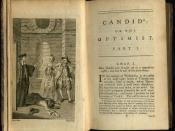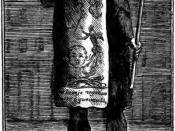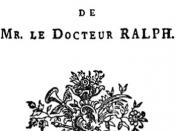Candide Analysis The purpose of the book as I perceived was to criticize the 18th Century civilization. This criticism emphasized most prominently on the feelings of the Enlightenment of this time period. The main feeling portrayed in the book is that life, as lived by most people in the 18th century, was miserable despite Pangloss's theory that, "all is necessarily for the best end (p. 1)."ÃÂ The book starts out in the Baron's castle of Thunder-ten-Tronckh in Westphalia. Candide, the main character, also lived in this wondrous castle. A Metaphysico-theologico-cosmolo-nigology professor named Pangloss also resided in the castle. Pangloss and his teachings greatly interested Candide and he paid with great attention. Pangloss taught Candide his theory that "all is necessarily for the best end (p. 1)."ÃÂ The Baron's daughter Cunegonde captivated Candide with her beauty. The Baron banished Candide for kissing Cunegonde. Candide wandered for a long time until he grew weak of hunger and fatigue.
Two men fed him and made him drink to the health of the Bulgarian king, and then forced him to serve the Bulgarian army. He was caught taking a walk and captured by the Bulgarians. He was forced to run the gauntlet thirty-six times or be executed. He chose to run the gauntlet but after the second time he could not endure it any longer. He begged to be executed and was granted his wish. Just as they were about to shoot him, the Bulgarian king learned that Candide was a metaphysian. He intervened and pardoned him. The Anabaptist James cared for Candide and fixed his wounds. Candide fled away from the Bulgarians. One later day, Candide was walking and he ran into a beggar with a disease that ate away at his face. This beggar turned out to be his old friend and...


